of gastroparesis, dehydration and malnutrition may occur, so appropriate treatment is essential. Diet also plays an important, crucial role in helping to alleviate symptoms and enhance gastrointestinal function.
Causes
When the stomach does not empty properly without any visible mechanical obstruction, such as a tumor or narrowing, it can be difficult to determine the source of the problem. Unfortunately, in almost half of patients, doctors are unable to determine the exact cause of gastroparesis. The causes can be very diverse, and often several mechanisms are at work in the body at the same time. The following are the most common factors that may contribute to this unusual condition.
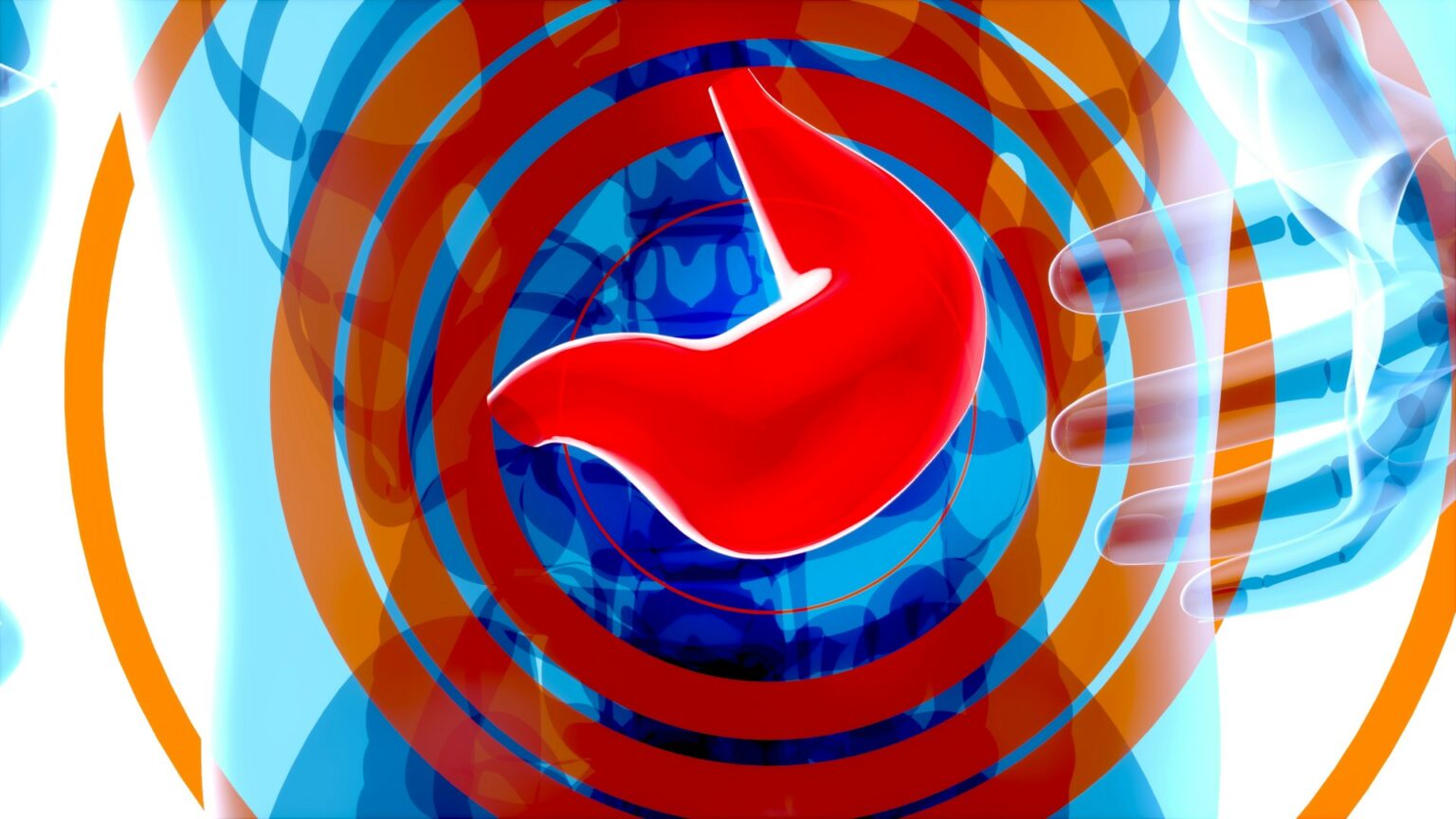
Nerve Damage
The proposed cause of gastroparesis is most often damage to the autonomic neurons in the stomach wall or the pacemaker cells of the stomach. A complex network regulates gastric motility by coordinating the central nervous system, the autonomic nervous system, neurotransmitters, and local gastric cells. The vagus nerve controls the peristaltic contractions that break down food, so damage to it can lead to gastric emptying disorders. For this reason, various neurological diseases can affect normal gastric emptying. Parkinson’s disease and multiple sclerosis cause damage to the nervous system. This damage can also affect the nerve pathways that control the digestive tract.
Metabolic and Endocrine Disorders
Various metabolic and hormonal disorders can contribute to the development of gastroparesis. In diabetes, complications associated with hyperglycaemia lead to reduced frequency of gastric contractions, slowed peristalsis, rhythm disturbances, and desynchronisation of gastric function. Therefore, inadequate control of blood sugar levels increases the risk of gastroparesis.
Thyroid disorders can also affect gastrointestinal motility. Hypothyroidism slows down metabolism and the activity of smooth muscles in the stomach, which delays stomach emptying. Hyperthyroidism, on the other hand, can disrupt the coordination of stomach contractions, although it less often leads to gastroparesis.
Cancer
Cancers such as stomach or bile duct cancer can cause problems with gastric emptying by disrupting its motility. In addition, chemotherapy or radiotherapy used to treat cancer can slow down gastric emptying, exacerbating the symptoms of gastroparesis.
Intestinal Ischaemia
Intestinal ischaemia, or reduced blood flow to the digestive tract, may contribute to the development of gastroparesis. Insufficient blood supply causes hypoxia of the smooth muscles of the stomach and disrupts their contractions, which delays gastric emptying. In addition, ischaemia can damage nerves, including the vagus nerve, which controls stomach motility, further exacerbating food passage problems.
Amyloidosis
Gastroparesis can also be caused by amyloidosis, a condition in which insoluble proteins accumulate outside cells in tissues and organs. The accumulation of amyloid, composed of abnormal light chains, can damage peripheral nerves and the autonomic nervous system, significantly impairing gastric motility.
Surgical Procedures
Postoperative gastroparesis is another possible mechanism of the disease. It occurs after surgeries that carry a risk of vagus nerve damage, such as certain stomach procedures. Patients who have undergone surgical procedures for obesity or duodenal resection are particularly at risk. Duodenal resection slows gastric emptying because it decreases plasma motilin levels. This hormone regulates the emptying of food residues from the stomach.
Medications and Lifestyle
Certain medications, including painkillers, antidepressants, and smooth muscle relaxants, can slow down gastric emptying and contribute to gastroparesis. In addition, unhealthy eating habits, lack of physical activity, and chronic stress can weaken intestinal peristalsis, exacerbating the symptoms of the disease.

Symptoms
Gastroparesis leads to a slowdown and sometimes even a stoppage in the movement of food from the stomach to the duodenum. Disorders in the functioning of the stomach walls can cause the accumulation of undigested residues, which undergo excessive fermentation and promote the growth of bacteria. As a result, the disease causes many unpleasant symptoms, which can be atypical and often confused with other gastrointestinal disorders. In people with mild gastric motility disorders, gastroparesis may be asymptomatic, which makes diagnosis difficult.
The main symptoms include indigestion, such as discomfort and pain in the upper abdomen, which affects about half of patients and often prompts them to see a doctor. Nausea and vomiting also frequently occur, sometimes causing weight loss, poor nutrition, or dehydration. Patients often experience a feeling of fullness, bloating, heartburn, and belching due to the retention of food in the stomach. Premature or excessive satiety is also characteristic of gastroparesis, when the patient feels full even after a small meal.
In some cases, additional symptoms may occur, such as hiccups or dysphagia, i.e., difficulty swallowing. Swallowing may be difficult, and in the most severe cases, it can even be impossible. Although the feeling of fullness and bloating may suggest weight gain, gastroparesis usually leads to weight loss rather than weight gain.
Complications
Gastroparesis significantly reduces patients’ quality of life. Long-term symptoms can cause stress, fatigue, and a limited social life. In severe cases, gastroparesis can lead to serious complications that significantly worsen the patient’s condition. Therefore, it is not worth underestimating its symptoms, and it is better to seek medical help as soon as possible.
Weight Loss
Gastroparesis causes weight loss because delayed gastric emptying leads to early satiety, nausea, and vomiting, preventing patients from eating enough food. Although weight loss may seem beneficial to some, it is actually an important warning sign.
Dehydration
Gastroparesis can also lead to dehydration because delayed gastric emptying often causes vomiting and limits fluid intake. As a result, the body loses water faster than it can replenish it. Even mild dehydration manifests itself in increased thirst, headaches, dizziness, and excessive weakness. Prolonged or severe dehydration can seriously disrupt the body’s functioning and be life-threatening, so people with gastroparesis should take special care to stay hydrated.
Malnutrition
In extreme cases, gastroparesis can lead to malnutrition because slow gastric emptying makes it difficult to eat and digest food properly. A lack of essential nutrients disrupts the body’s functioning, and when combined with dehydration, can lead to electrolyte imbalances. Electrolyte deficiency, in turn, affects the nervous system and blood pressure and, in severe cases, can cause fainting, seizures, heart problems, and even paralysis.

Diagnosis
Gastroparesis often has non-specific symptoms, which is why it can be challenging to diagnose. So, it requires several specialist tests. It is crucial to check how quickly the stomach empties after a meal. The most commonly used method is scintigraphy — the patient eats a meal with added technetium isotope, and the doctor assesses the rate of gastric emptying over several hours. An alternative is the gastric emptying breath test (GEBT), in which samples of exhaled air are analysed. This test closely reflects the results of scintigraphy, although it may be less reliable in people with respiratory diseases or malabsorption disorders.
Physicians use an upper gastrointestinal endoscopy to exclude mechanical obstruction as the source of the symptoms. This test allows the pH, pressure, temperature, and transit time of food through the various sections of the digestive tract to be assessed.
Radiological examinations with barium contrast, which show the shape and function of the digestive tract, are also helpful in diagnosis. Manometry, in turn, allows for the assessment of the coordination of stomach and duodenal contractions. Doctors mainly use abdominal ultrasound to rule out other diseases. It is very important to distinguish gastroparesis from conditions such as reflux or peptic ulcer disease, as they have similar symptoms.
Treatment
Treatment for gastroparesis usually involves a combination of medication and dietary changes. Its main goal is to improve stomach function and the patient’s overall health. If another disease, such as diabetes, causes the problem, it is also necessary to treat that disease appropriately in order to control the symptoms of gastroparesis effectively.
Pharmacological Treatment
If tests confirm delayed gastric emptying without the presence of a mechanical blockage, your doctor may prescribe prokinetic drugs to stimulate the stomach. It is best to take them just before meals for maximum effectiveness. This treatment often yields positive results, with symptoms improving in the majority of patients. If necessary, medications to relieve nausea and vomiting are also used.
Diet Modification
In the case of gastroparesis, comprehensive treatment is necessary, which includes not only medication but also dietary changes. What we eat has a huge impact on how our stomach works. Doctors recommend eating smaller portions more often and choosing easily digestible meals with limited fat and controlled fibre content. This type of diet can alleviate symptoms. Avoiding alcohol and sparkling drinks can help reduce bloating and prevent symptom flare-ups. In more severe cases, it may be necessary to consume food in a minced or liquid form.
As gastroparesis increases the risk of weight loss, dehydration, malnutrition, and electrolyte imbalances, proper nutrition plays a crucial role in maintaining overall health. Therefore, your doctor may also recommend vitamin and mineral supplements to compensate for any deficiencies.

Other Methods
Sometimes, drug and nutritional treatment do not produce the desired results. In such situations, and when there are contraindications to the use of drugs, patients may consider other methods of treatment. One of these is gastric electrical stimulation, which involves implanting a special device that generates electrical impulses into the stomach wall. These impulses are designed to stimulate the stomach muscles to contract regularly, thereby improving their motility and accelerating the emptying of food content. GES also helps to reduce nausea and vomiting, which are among the most troublesome symptoms of gastroparesis. Although this method does not eliminate the cause of the disease, it can significantly improve patients’ quality of life.
Various treatments, more or less invasive, are also possible. Some doctors perform a venting gastrostomy, creating a fistula to the stomach to allow the patient to drain excess gas and food contents. Nutritional jejunostomy involves inserting a tube directly into the small intestine so that the patient can receive food without passing through the stomach. Pyloroplasty is a procedure that widens the pylorus, i.e., the outlet of the stomach into the duodenum, which facilitates the passage of food. Botulinum toxin injections into the pylorus are also used to relax it, although controlled studies have not confirmed its effectiveness.
Sources
- Anil Kumar Reddy Reddivari, Parth Mehta (2024). Gastroparesis. https://www.ncbi.nlm.nih.gov/books/NBK551528/
- Mattis Bekkelund, Dag A. Sangnes, Jan Gunnar Hatlebakk, Lars Aabakken (2019). Pathophysiology of Idiopathic Gastroparesis and Implications for Therapy. https://www.tandfonline.com/doi/abs/10.1080/00365521.2018.1558280
- Michael Camilleri (2007). Diabetic Gastroparesis. https://www.nejm.org/doi/full/10.1056/NEJMcp062614
- Michael Camilleri, Victor Chedid, Alexander C. Ford, Ken Haruma, Michael Horowitz, Karen L. Jones, Phillip A. Low, Seon-Young Park, Henry P. Parkman, Vincenzo Stanghellini (2018). Gastroparesis. https://eprints.whiterose.ac.uk/139693/3/Gastroparesis_v4_clean_9_28_18.pdf
- Michael Camilleri, Kenton M. Sanders (2022). Gastroparesis. https://www.sciencedirect.com/science/article/abs/pii/S0016508521037008
- Gaurang Nandkishor Vaidya, Denyse Lutchmansingh, Manju Paul, Savio John (2014). Gastroparesis as the initial presentation of pulmonary adenocarcinoma. https://casereports.bmj.com/content/2014/bcr-2014-207228.short
- Michael Camilleri (2016). Functional Dyspepsia and Gastroparesis. https://karger.com/ddi/article-abstract/34/5/491/103037/Functional-Dyspepsia-and-Gastroparesis?redirectedFrom=fulltext
Restless Legs Syndrome: What Is, Causes, Symptoms, and More

GERD: What Is, Causes, Signs, and More
C. Diff: What Is, Epidemiology, Transmission, and More

Lyme Disease: What Is, Causes, Risk Factors, and More
Hashimoto’s Disease: What Is, Causes, Symptoms, and Diagnosis

Epstein-Barr Virus: Symptoms, Causes, and Treatment

Shingles: What Is, Causes, Warning Signs, and Diagnosis

Sepsis: What Is, Course, Causes, and Symptoms

Autoimmune Disease: What Is, Causes, Types, and Symptoms
Bell’s Palsy: What Is, Epidemiology, Causes, and More

Urinary Tract Infection: What Is, Causes, Symptoms, and More
Bronchitis: What Is, Signs, Diagnosis, and Treatment

Anemia: What Is, Causes, Symptoms, and Types

Bipolar Disorder: What Is, Causes, Symptoms, and Phases
Fatty Liver: Causes, Epidemiology, Symptoms, and More
